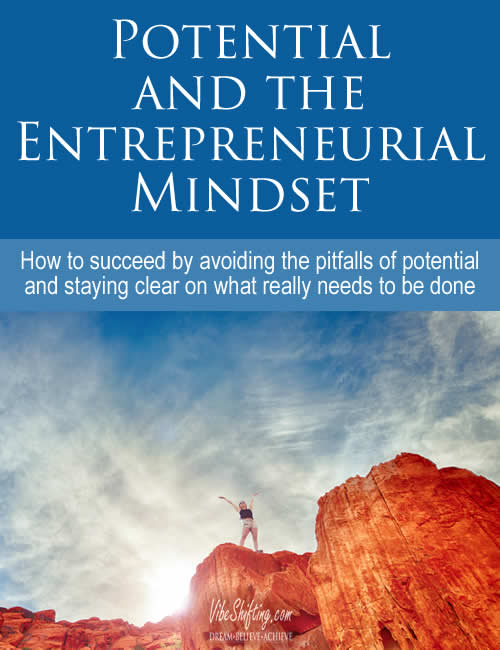 In today’s show, part one of my interview with guest expert Lisa Somers, we discuss the danger of potential and getting stuck in other people’s ideas about what’s the “right” or “essential” way to do things. In part two of our interview, which airs next Friday, we’ll be taking about motivation and the importance of staying true to yourself. If you want to make sure you never miss an episode of The Vibe Shifting Show, be sure to subscribe!
In today’s show, part one of my interview with guest expert Lisa Somers, we discuss the danger of potential and getting stuck in other people’s ideas about what’s the “right” or “essential” way to do things. In part two of our interview, which airs next Friday, we’ll be taking about motivation and the importance of staying true to yourself. If you want to make sure you never miss an episode of The Vibe Shifting Show, be sure to subscribe!
This Expert Series Guest Interview Has Two Parts:
1708 Potential and the Entrepreneurial Mindset
1709 Mindset Shifts for Staying True to You
[powerpress]
Show Transcript: Potential and the Entrepreneurial Mindset
Nathalie: So welcome back to the Vibe Shifting Show everybody! I have another special expert guest today. And we are talking with Lisa Somers from The Mindstein System.
Lisa is a human behaviour geek and founder of the Mindstein System. As a psychology graduate, Lisa began working with financially successful entrepreneurs and began helping them to reduce overwhelm and stop burning bridges in their personal lives.
Through proven psychological principles she has helped many entrepreneurs get their personal lives back on track and unleash even more incredible results in their business empires. So, welcome Lisa, and I’m so glad to have you here today!
Lisa: Thank you so much. I’m actually really looking forward to this. I am so excited to get started.
A Psychological Approach to New-Age Concepts
Nathalie: Now, in the Mindstein System, I was poking around on your Web site and you said a lot of things that I found really interesting because you do a lot of the same sort of things that I do. You deal with a lot of this, I don’t want to call it New-Age-y stuff. But…
Lisa: That’s OK.
Nathalie: …these are concepts that have been taken over and are becoming very popularized through the New Age movement. But you approach these things in much the same way I do, with a very psychological background.
For a lot people, if you say anything “new age”, they think it’s all fluffy nonsense. But there is a lot of actual science and psychology behind a lot of these ideas. And that’s the way that you approach what you do, is it not?
The Scientific “Why” Behind LOA
Lisa: Sure. And that’s exactly why I approached it in this way. Because for me when I when I studied psychology at university, I became really, really interested in the science aspects of why we do what we do as people.
And I found that a lot of what was out there was the more anecdotal evidence, I guess you could say, or just a story that someone tells. And while I find that really useful, I did want to look for a more evidence based research into things.
Like if we’re overwhelmed, why are we overwhelmed? What’s going on in our brain that we can’t cope with this level of overwhelm and things like that. I don’t go too heavy into the brain chemistry of it all. I feel like, unless you’re in that kind of field, it’s a little bit too heavy. But I like to have a scientific background in mind when I’m talking about things.

Making Things Make Sense
Nathalie: I think that’s brilliant because, as I said, I think a lot of people they think it’s all law of attraction fluffy stuff, and they sort of dismiss it. But once they realize that there is real science behind it, they become much more able to accept these ideas and these concepts and to then be able to use them in their lives to create a better experience within their lives.
Lisa: For sure. And this is something I often struggled with myself because I struggle quite a lot with spirituality and that whole concept. And I know this is a little off topic but it kind of makes a point that I want to make and that is because I found a lot of it just wasn’t logical enough for me. It wasn’t clear cut enough.
You Move Towards What Your Brain is Focused On
And I know that not everything in life can be clear cut. But with things like the law of attraction, I can look at that now and say okay I know that if I think about something – so if I’m thinking about making more money – my brain is predisposed to go look for ways to do that. But if I say to myself, okay, yeah I’ll never be successful, my brain just slams the door in the face of all the possibilities out there.
When you’re #focused on something, your brain is predisposed to find ways of making it happen. Share on XAnd so, for me, that’s the scientific aspect that you know that… research and evidence shows that if your brain is focused on something you will automatically start to move towards that. And so that’s what I try and leverage in my own business, and in my own work.
Nathalie: A lot of these cognitive biases that are real psychology that get co-opted by this Law of Attraction movement.
Lisa: Yeah.
Nathalie: Psychology. I love that.
The Danger of “Potential”
Nathalie: One of the things that you mentioned that particularly caught my ear, or my eye, was you had, I think it was a livestream on your Facebook page where you were talking about the danger of potential.
Lisa: Yes.
Nathalie: Tell me a little bit about that. Because normally when people think about potential it’s a good thing, right? Potential is great, it’s great to have potential. But why is it a danger?
Potential Can Sometimes Be Positive
Lisa: It is great to have potential and it’s a fantastic thing to say or to hear from other people.
And if you think about even when you’re a kid, people often ask you “what do you want to be when you grow up?” And you might be three or five or whatever age then. And that automatically… people would say, “oh you have the potential to be a really singer because you’re a great singer now so imagine what you could do when you grow up.”
And so that’s a great thing because it gives you something to move towards. It gives you something to work towards or something to be proud of that you’re good at.
But the problem comes in with the word potential because if you think about those little kids, like we were when we were little kids, your parents — not all parents. Actually my parents weren’t like this, which was nice. But a lot of parents will push kids to do sports or play music at a really high level because they want them to fulfil this potential they have.
Outcomes at the Expense of Process
And so what happens is with this we immediately become focused on outcomes as opposed to process or process or whatever way want to pronounce that. The problem there is we’re encouraging people to meet these goals, to meet these high expectations.
And number one we don’t really stop to think about do they want to do this. Like is this their potential, or is it something that I am imposing?
Or even in our adult lives now it’s like potential… potential means, basically the capacity to develop something. So that might be a skill or a new career or a new path of life.
The problem with #potential is it keeps us focused us on outcomes rather than process. Share on XNegative Thought Patterns Take Over
And if we think about this, there are a few reasons why that can cripple us. And so the reason, the main reason is because a lot of us… we have this tendency to beat ourselves up. And because potential is not guaranteed, this then leads to this negative thought pattern of, “well, maybe I’m not good enough to do that” or “maybe I should just do something that’s a bit safer or have a bit more security.”
And that’s what you’ll find a lot of entrepreneurs… Initially they’re put off starting a business because someone has said to them “Well, you’d be much better off on a job, it’s safer.”
Nathalie: Absolutely.
Lisa: Yeah, exactly. You know from my experience…
Nathalie: I think we’ve all heard that before.
Potential Makes You Focus on the Wrong Thing
Lisa: Yeah, and you know it’s just not true. I mean there’s risk in everything in life. But if you want to do something you’re going to be successful at it if you really implement and put in the work.
And so potential, that just immediately puts pressure on people to do things, and they don’t want to waste their potential. That word is just thrown around. But what happens is we become focused on the wrong things.
And that’s really the point I’m trying to get across here. Just as a kind of caveat to this, the word potential can also be fantastic. If someone says “Your business is going really well. You have the potential to have a seven figure business and to be completely financially independent.” Right? That’s great because that might give you the boost you need to go out and make something happen.
Nathalie: Unless it sort of makes you panic because you’re not there yet and you have no idea how you’re going to get there.
Getting Stuck in Potential
Lisa: Exactly. And that’s the other side of it and that’s what I was trying to flag with that livestream was that potential is not always a good thing because if we’re… say we’re having a bad day… we’re maybe not feeling very confident… we can become very caught up in these negative thought patterns.
And we look at other people that are successful and who have the potential to do great things and did do them. And we say “Hmm, I don’t know. I don’t know if I could do that.” And that’s when we get, we become… we’re in this stuck mode. We just don’t move because…
Nathalie: …we can’t see the path from where we are to where we want to be.
Potential Creates an External “Locus of Control”
Lisa: Exactly. And the potential, it goes hand in hand with the expectations of other people I think because usually if you’re thinking about potential it’s because somebody has said you have the potential to do this.
And so you get caught up in, it’s like you know your “locus of control”. We always talk about this in psychology and stuff. And it’s a term that’s thrown around a lot. And if your locus of control is external, it means that basically everything you think about yourself is based on what other people think about you. You give that control to other people.
Nathalie: That’s a dangerous, dangerous thing.
Lisa: Definitely. And if you get caught up in this potential that you have it may be based on what other people want you to do as opposed to what you actually want to do.
Other People’s Expectations and Your Own Motivation
Nathalie: And I think part of the problem with that, though, is most of us have spent a lifetime – years, maybe decades trying to live up to these outside expectations of what other people think we ought to do that we’ve lost touch with what it is that we want to do. I come across people and they… really they just don’t know what they want to do any more.
Lisa: Yeah. And the thing that’s interesting about that is you know we always talk about in pop psychology and in kind of all of this entrepreneurship and this whole field, we talk about knowing your why or knowing your inner motivation. It’s like the main phrase that you hear all the time.
And what’s interesting about knowing your why is a lot of people would tell you that they know why they’re doing something, that they know their motivation. But actually they don’t know it at all.
Nathalie: They don’t.

Patterning Your Life on Other People’s Success
Lisa: They haven’t got a clue. And the problem with that is that a lot of the time they are basically replicating someone else’s success, is what they’re trying to do. They don’t know what they want and so they look at someone else’s life and say “Oh I think I’d like that.”
Nathalie: And they try to pattern themselves on what somebody else has done.
Lisa: Which again can be a great motivator. Like, if you look at Marie Forleo, she’s one of my idols, and I’d love to get to a level she’s at. That’s great for me because it helps me to be better each day. But it can also be super-intimidating because those people are at such a high level and if you’re not there yet, it’s not going to line up with who you are right now.
And this is something that’s a really, really important concept and it’s one that people miss a lot. They always focus on where they want to get to, but they kind of skip the fact that that’s not where they are now. That’s not what their mindset is like now.
The Mindset Shift Between Here and There
Nathalie: Yeah. There’s a process that they have to get through in order to develop themselves to be able to get to the next level. We look at somebody like Marie Forleo, or — I don’t know, Danielle Laporte or somebody like that. And we see this massive success but we don’t see all the steps that went into things, what they were doing, what they were struggling with before they got to that stage.
So it’s as if, in our minds, they never went through any of that stuff, they were just great at doing what they’re doing from day one. They just walked out onto the stage and they were “Marie Forleo” up in lights, instantly. But that’s not how it works.
Lisa: No.
Nathalie: Even Marie Forleo would have had her dark days and her moments of struggle and questioning herself and self-doubts and all of that. She would have gone through all of that. We just don’t see that because we’re only seeing the present stage.
Inner Motivation Fuels Success
Lisa: Yes exactly. And I think there there’s a real disparity between people who want to be successful and people who actually are successful. And the people who are successful in life, their motivation truly does come from within and they’re living up to their own potential and not someone else’s.
And I think that’s the critical thing here is that– and that’s how potential can be used in a positive way. If you know your potential and you know that you can get there. And that it’s actually a legitimate goal to have, then you’re far more likely to get there than if you have this completely off the wall goal that’s crazy, and then you don’t take any steps to get there. And you wind up just feeling miserable because you didn’t achieve it. And whatever. You get stuck in that cycle again.
Clarifying the Concept of a “Legitimate Goal”
Nathalie: But that concept of what’s a legitimate goal – that would be specific to each individual. Because what’s legitimate for me may be completely different from what’s a legitimate goal to you.
Lisa: Oh, exactly, exactly. And that’s why this thing of basing your success on other people, it just doesn’t work because you’re trying to live someone else’s life. You’re trying to achieve someone else’s goals.
Other people’s ideas about your #potential often force you into living a life that isn’t yours. Share on XDon’t Try to Follow a Path You’ll Hate
Lisa: And if you think about that… if I saw someone and they were a professional cyclist and they were fantastic at cycling, they won so many big championships. And I hate cycling. Then, if I try and do that, it’s not going to work, you know? Just because I want to achieve that success – I’m not going to like the process…
Nathalie: You’re going to be miserable.
Lisa: Yeah I’m going to hate it and I’m not going to do it. I saw the other day in a group I’m part of, I can’t remember which one – I’m part of a lot. It was, a girl posted about her Facebook group and how she hates posting in it, and she just finds it so frustrating because the people don’t engage in the way she wants them to.
And it was just so negative and I just looking at it and I said, okay you’re only doing this because you feel it is the way to success because everybody else talks about Facebook and groups and whatever. And for a lot of people it’s going to be the way success. But if you absolutely hate posting on Facebook, if it’s just not your method of communication, then why are you doing? Find another way.
Be Careful With What You “Should” Do
Nathalie: I’m just going to pause you for a second here because that is something absolutely critical, and I think so many people overlook that. And I know I’ve done that myself. I think anybody who is in any kind of entrepreneur or authorpreneur or any kind of situation where you’re trying to create something like that, you get so sucked into this whole “what the experts are saying” and “what you should be doing”. And so often on my own Web site, and with people I work with, is you have to be really careful with that word “should”.
Lisa: Yes.
Nathalie: You have to be so careful with it because so often when we do things because we think we should do things, it’s not going to get us the kind of results we want. You’re sort of trying to make yourself fit into a mold that was just never meant for you. And you just… you can’t force yourself to work with a system that you just don’t have the right mindset, the right personality, whatever, to work with.
Like, for example, you seem to love doing these live streams.
Lisa: Yeah, I’m a big fan.
The Livestream Example
Nathalie: Last year I did get into it. I tried so hard to do the video thing. I was posting regularly to my YouTube page. I even went into this whole Periscope thing. And you know what? I hated it.
Lisa: Yeah.
Nathalie: I hated it. I got all these horrible… as soon as I started getting the… I’m sure you’ve had to deal with this yourself, being a woman doing these things, but as soon as I started getting those nasty, nasty, crude comments from men I don’t even know on my livestream chats, I was just “Oh my god, I can’t deal with this.” It just totally soured me on the whole experience. And I’m much more comfortable doing audio.
Lisa: Yeah.
Nathalie: So for me when I think video, oh god, I’ve got to put on makeup and there’s got to be lights and blah, blah, blah, blah. And it’s just painful for me to deal with video. So I just made the decision this year that I’m just not going to do that anymore, that’s not the way I want to go. So I’m going to focus more on the audio stuff because that’s where I like to be.
But, again, you get sucked into this concept of what you should do, what the experts say you should do, what the next big thing is that everybody has to jump on this wagon right now because it is the next big thing. And you have to be so careful with that.
The Entrepreneurial “Obligation Game”
Lisa: Yeah, and I think the thing there is, as well is, I talked about this on another day, on another livestream. I talked about the obligation game that we play as entrepreneurs. And that is basically that we get so caught up in saying “I have to do this”.
I have to answer emails, I have to respond to this client or whatever and they’re annoying me. Or whatever that might be in whatever business you’re in. And I just talked a little about, I like talking about language and that’s why I talk about the word “potential” and the different connotations of that word.
Changing the Way You Look at Things
And another word is I have to, or I should. And really if you can look about word and change that around to saying “You know I’m blessed to do this.” I am happy to do this because, you know why? Because I run my own business and a lot of people out there are in jobs that they’re miserable in or they hate their life, and I don’t because I’ve created this. From nothing. You know, there was no Mindstein System before me. And now there is.
How a Perspective Shift Helps
And really that kind of mindset shift will help you then to do the things that you don’t necessarily love because, you know, some things just have to be done, right? We don’t love responding to emails because it’s boring and whatever. But it has to be done.
And so if you can change that language around and those thoughts around in your own head then that frees you up to, number one, get shit done. And, number two, feel better about it and not feel like you’re stuck doing something you don’t want to do.
What Really Has to Be Done vs What you Think Has to Be Done
Nathalie: Yeah. And I guess there are two streams to that. I mean, there are… Sometimes you force yourself to do things that you really… you’re just wasting your time because it’s just not you. But then you do have to sort of change the way you think about the stuff that really does have to get done.
Lisa: Yeah.
Nathalie: You have to make that clarifying point there between what is stuff that really does have to get done and what you’re doing just because you think you should, but you don’t need to.
There Are No Rules
Lisa: Definitely. I think it’s good to, especially with the livestreams like you were saying, you just didn’t enjoy it. It wasn’t working out for you. And a lot of people they keep trying, they keep doing these things. And when they’re not working at all — and that’s not to say you should just give up on something when you don’t like it — but if you’re really, really good at audio then just go do that. There’s no point in… there are no rules in this.
Lisa: And that’s the thing that people don’t tell you when you start out your own business. You follow the experts, right, and you kind of go “OK, I’m going to follow everything they tell me and I’m going to have a successful business.”
But who do you think told the experts? No one. They just figured it out. So if you can figure it out in a way that works for you, then that’s absolutely fine.
Different Opinions About What’s Essential
Lisa: You don’t need to do everything that everyone is telling you because you could watch… you could do a course, an online course in social media or whatever. And it will say to you livestreams are the way to go, you need to be doing livestreams.
You can do another one which will say you have to be on Instagram, Instagram is the way forward.
There’s messenger bots on Facebook, there’s email lists, there’s everything. There’s Pinterest, whatever, you know?
But if you try to do everything your head would explode. So if you can find what you like, then forget the experts for a minute. Because remember you’re living up to your own potential here, you’re not trying to do what everyone else is doing. You’re not basing your success on other people.
Focus on your OWN #potential and don’t try to base your concept of #success on other people. Share on XYour Business, Your Way
You want to run a successful business, but you also want to run your business, and not run a business based on someone else’s thoughts, basically.
You don’t want to follow blindly because the whole point of being in business is that you work for yourself now. You can use your own ideas, your own creativity and you’re not bound.
And so you know a lot of people allow themselves to become bound and stuck in what other people say they should do. And that’s really what cripples us. We get so caught up in that and we just can’t move forward. And then we’re trying to do 10 different platforms. And it’s just impossible.
Try Different Paths
Nathalie: Yeah I think that’s key. Especially when you’re new and you’re just starting out, I think it’s a good idea to sort of pay attention to what the experts are doing, and what they’re saying you should be doing. And just try it out and see how it works for you.
And if it’s really not for you, try something else out. I think you have to figure out what works for you and, really, you have to create your own path or you blaze trial through this whole thing. Because what works for you is going to be different then what works for somebody else. And the thing that you have to be really comfortable with is that that’s okay.
This has been part one of my interview with Lisa Somers from the Mindstein System. Be sure to tune in next week for part two, where Lisa and I discuss the idea of the “exclusive solution” and how it contributes to overwhelm. We also chat about real motivators and staying true to yourself, and Lisa shares a simple exercise for helping you to stay focused and take action in your life.
 About Today’s Guest Expert:
About Today’s Guest Expert:
Lisa Somers is a human behaviour geek, and founder of the Mindstein System. As a psychology graduate, Lisa began working with financially successful entrepreneurs and began helping them to reduce overwhelm and stop burning bridges in their personal lives through proven psychological principles. She has helped many entrepreneurs to get their personal lives back on track, and unleash even more incredible results in their business empires. Lisa lives with her partner, and her border collie, Jackson in the South East of Ireland. She is also an avid reader, and could talk all day long about Stephen King books. You can connect with Lisa through her Facebook group or over on Instagram!
Photo credit: mountain sky via pexels.com cc (modified by me) Photo of Lisa Somers courtesy of Lisa.
















